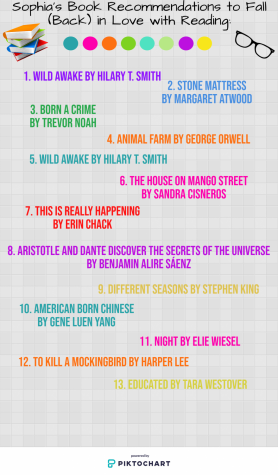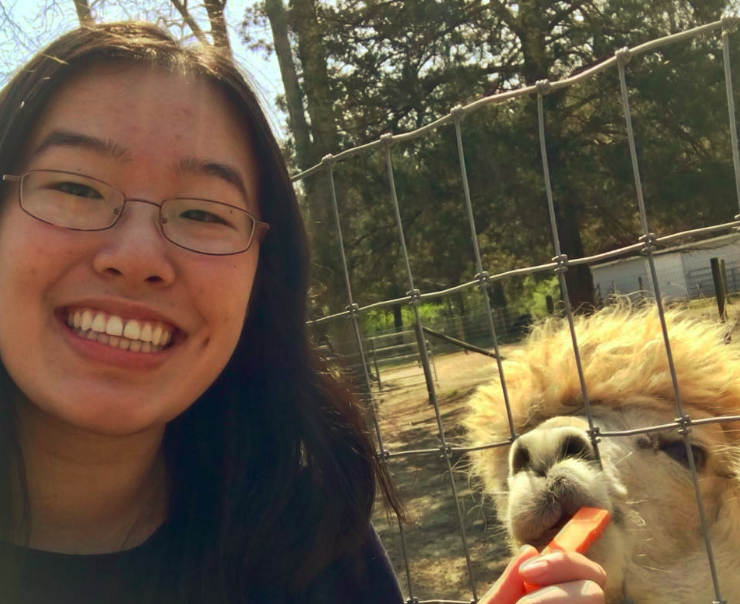Sophia tries recreational reading before bed

A stalwart poplar bookcase towers beside my bed, standing guard each night as I fall asleep. Its shelves groan with the weight of cracked spines, crinkled pages and thoughts scribbled into margins — a breathing record of my seventeen-years-and-counting journey.
I discovered my fondness for reading when I was four years old, as the only child of immigrant parents stranded in a sea of swirling, foreign tongues. Books were a way to find solid ground. The kids on the playground teased me for my accent and weird lunches, but I could always swing across the creek with Jesse and Leslie or discover the very loyalest of friends in Wilbur and Charlotte. I soared above Hogwarts with Harry, ran through the Met with Claudia and Jamie and adventured with the Baudelaires through a series of some truly unfortunate events. My English rapidly improved, and soon I could help Mom and Dad answer phone calls and write letters, giving our little family a voice in this country. Today, my books are dog-eared and rain-soaked and spaghetti-sauce-stained. There’s a paint splatter covering Ramona Quimby, and Matilda is missing her twenty-third page. These are the battle scars they wear from being so wholly and fervently loved for an entire childhood.
As I entered high school, however, that love began to fizzle out. Reading started to feel less like an escape and more like a chore. I moved Nancy Drew and Hugo Cabret off my shelf to make room for Fundamentals of Physics and American History: A Survey. Books arrived from administration-sanctioned lists, not spontaneous wanderings to the back of the library. Every idea came with the burden of a well-incorporated quote, a parenthetical citation and a critical red pen. Literature turned into mere rotating subject matter on which to churn out five-paragraph essays.
***
A few weeks ago, I came to the disappointing realization that I couldn’t even remember the last book I’d read for fun. I went from lugging novels home from the library by the dozen to only finishing three or four non-required readings in an entire school year. Somewhere in between, a part of me had gotten lost, and I wanted to reclaim it. So I decided to take on the challenge of reading an hour a day for twenty days.
For the purposes of the challenge, I only counted time spent on recreational reading, without including school assignments. After rummaging in my room to find some books I’d bought with good intentions but had never gotten the chance to open, I chose East of Eden by John Steinbeck, a modern retelling of the Biblical Cain and Abel story, and Sapiens by Yuval Noah Harrari, an anthropological exploration of human history, to occupy me for the next three weeks. Yes, recreational reading.
On Day 1, I’d made it about two pages into East of Eden when it become clear that my reading hiatus had taken its toll. Years of reading mostly textbooks, news articles and Buzzfeed listicles promising to tell me what kind of avocado toast I am based on my zodiac sign had drastically decreased my attention span. I found myself skipping entire sentences as my eyes darted across a page, habitually skimming to find thesis statements and chapter summaries and flashy headlines. After a while, I started feeling twitchy without the instant gratification from checking my phone every ten minutes, craving the mini dopamine hit from each unread text and red notification bubble. Distractions punctuated my first few days’ progress, and I trudged along, re-reading and re-re-reading. My patience and self-control improved over time, though. By Day 12, I kept reading continuously even after the hour was up.
The other big hurdle was figuring out how to squeeze a free hour out of my busy schedule every day, especially when I was already scrambling to complete my assigned readings for World History, Biology and English. I took advantage of brief periods of downtime throughout my day — riding the bus, standing in line, waiting for the bell to ring — to chip away at Sapiens, which is split up into many short sections that can be knocked out in two-minute sprints. I also downloaded the Libby app to borrow free ebooks with my library card, allowing me to read on my phone while on the go instead of mindlessly scrolling through social media. The reading minutes scattered throughout the day were easy to complete but added up quickly. I decided Steinbeck was better enjoyed in longer stretches, so I kept East of Eden on my nightstand. Every night before bed, I roamed the soil and the sky of Salinas Valley.
By the end, I’d actually slightly exceeded my goal — I read for 24 days in a row for anywhere from one to one and a half hours each day. I finished both books and totaled 1,018 pages read, or an average of about 40 pages a day. That wasn’t half bad. But the most important changes were uncountable, and they’ll last far beyond this challenge. I’ve increased my attention span, gained a greater body of knowledge and reduced my anxiety. I followed people ranging from ancient Homo sapiens to a false war hero from Connecticut as they wrestled with the same human struggles: love, corruption, guilt, freedom. For the first time in a long time, I released all the rubrics and expectations and devoted a moment completely to myself. I sat alone with only a good book and my own thoughts, yet it felt like coming home to an old friend.
***
For 20 days, I revisited my steadfast shelf, brushing away the dust to reveal my most treasured possessions. In turn, my books have cracked my spine, crinkled my pages and scribbled into my margins, breathing their stories into me — I am richer for having read.
